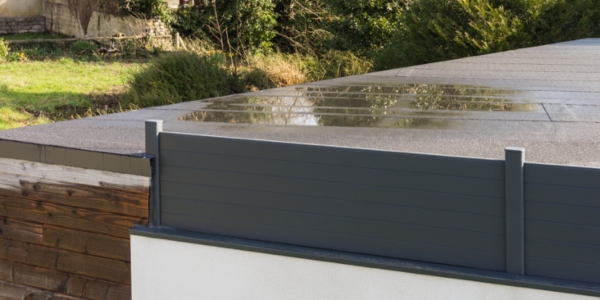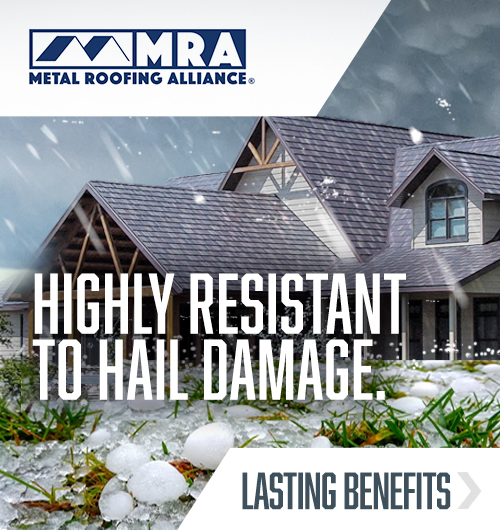Common Low-slope Roofing Terminology Every Homeowner Should Know

By John Kenney.
It’s important to know what you’re dealing with when it comes to renovating or installing a low-slope roof. This article covers the basic terms home and building owners may want to familiarize themselves with in preparation for working with a low-slope roof.
Editor’s note: John Kenney from Cotney Consulting Group shares his expert advice for homeowners on relevant low-slope terminologies!
A low-slope roof is sometimes referred to as a flat roof, but that can be misleading because roofs should never be flat. These roofs have a very low slope and may look flat to the naked eye. Low-slope roofs typically have a minimum slope of one-fourth inch vertical to twelve inch horizontal (¼ per foot rise), depending on the roofing material. Roofs are considered low-slope roofs up to 3:12 pitch.
There are many words contractors often use when referring to certain features and aspects of low-slope roofs. Here are a few examples of different low-slope terminology and their meanings to share with your customers:
Asphalt: A black or brown petroleum-like material used in various roofing materials and systems.
Asphalt cement: An asphalt-based sealant material to seal and adhere to roofing materials and is used in new installations and roof repair projects.
Ballast: A material installed over a roof membrane to help protect or hold it in place. Ballasts can consist of aggregate or concrete pavers.
Base Ply: The primary ply of roofing material in a roof system. Usually, a single layer.
Base Sheet: An asphalt-impregnated or coated felt used as the first ply used in built-up and modified bitumen roof systems.
Blistering: Bubbles that appear when moisture or air is trapped beneath the roofing layers.
Built-up Roofs (BUR): A low-sloped roof that consists of multiple layers of asphalt and ply sheets.
Cap Sheet: A roofing membrane with a granule surface used as the top ply of BUR or modified roof systems.
Caulk: A sealant used to fill or seal a joint or gap to prevent leaks.
Coating: A monolithic, fully adhered, fluid-applied roofing membrane used to protect and extend the life of an installed roofing system.
Condensation: The process where water vapor becomes liquid.
Coping: Fabricated commonly from metal and used to cover the top of a wall to protect it from the elements.
Counterflashing: A material usually fabricated from metal and installed over rooftop base flashing systems.
Decking or substrate: The material that lays between the structural components of a roof (joists and trusses) that the insulation and the roofing system are installed over. Common material in commercial construction is steel, precast concrete panel, structural concrete, cementitious wood fiber, wood planking, plywood/OSB and poured gypsum.
Downspout or leader: A pipe for draining water from roof gutters or scuppers.
Drip edge: A trim metal piece is installed at the roof's edge
EPDM: A synthetic rubber single-ply roofing membrane (ethylene propylene diene terpolymer) used in low-slope applications.
Fasteners: Any type of screw, rivet or nail used to secure insulation, base sheets, metal panels, trim and flashing materials together or to the roof deck.
Flashing: A material that is installed around a roof penetration or along an edge to help keep moisture from entering the layers below. Found along the roof's perimeter or at penetrations, walls, expansion joints, valleys, drains and other vertical areas of a roofing system.
Insulation: A material that is used to help maintain the temperature in a building by reducing the flow of heat to and from that building.
Membrane: The roofing system covering that serves as the waterproofing material. It can be composed of one material, or several materials laminated together.
Mineral-surfaced roofing: A type of asphalt roll roofing that has a granule surface.
Modified bitumen: A rolled roofing membrane manufactured with polymer-modified asphalt and polyester or fiberglass reinforcement.
Mopping: When a roofer applies hot asphalt or coal tar using a hand mop or mechanical applicator.
Penetration: Any constructed item going through the roofing system that requires flashing.
Ply: The number of layers of roofing membrane.
Polyvinyl chloride (PVC): A single-ply roofing membrane made from a synthetic plastic polymer used in low-sloped roofing applications.
Ponding: Water that accumulates in low-lying areas on a roof.
Primer: A liquid or aerosol spray used to prepare concrete and metal surfaces for roofing systems or flashing installation.
SPF (sprayed polyurethane foam): A material sprayed as a liquid in multiple layers to expand into a foam, creating a solid layer across an existing roof.
Square: A roof area measurement equal to 100 square feet.
TPO: A thermoplastic polyolefin single-ply roofing membrane used in low-slope applications.
Vapor retarder: A vapor-resistant material or membrane that reduces the rate at which water vapor can move through a material installed in a separate layer during roofing installation.
Warranty: This is a legal document from the roofing manufacturer or contractor to cover any issues with your new roof. There are three main types:
A standard manufacturer's warranty covers the products you purchase.
An extended manufacturer's warranty covers contractor workmanship along with expanded coverage for the products.
- A workmanship warranty from the contractor covers the installation, usually for one or two years.
Have a question? AskARoofer.
Find your local roofing contractor in the RoofersCoffeeShop® Contractor Directory.










Comments
Leave a Reply
Have an account? Login to leave a comment!
Sign In